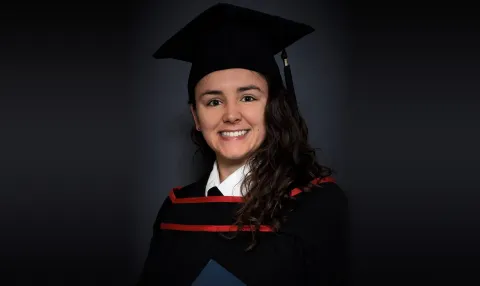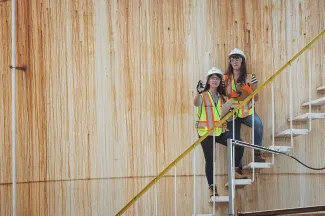"Our goal is to ensure that all our students graduate with a comprehensive understanding of Canada's Indigenous histories, cultures and practices so that they may become ethical, informed and empathic engineers."

Florence Belanger-Jones
- Degree:
- Bachelor of Applied Science
- Grad year: 2020
- Program:
- Campus: Okanagan
I come from a family of geologists and engineers. I spent the first 20 years of my life travelling the world and resisting the temptation to study a STEM field. I originally started my post-secondary education in International Studies, hoping to travel for work and create positive change through diplomacy. I ended up studying civil engineering instead. This has allowed me to do much of what I had hoped with a focus on Indigenous community partnerships and engineering for international development.
Why did you choose to go into your field of study at UBC?
The theoretical world of international relations and policy seemed counter-intuitive to the kind of exciting, life-changing and hands-on work I had originally imagined it to be. I searched for a degree program as far removed from the Arts as I could think of. This led me to take high school level physics and chemistry courses online during a gap year in order to transfer into Engineering. By happy accident, it provided me with a challenge and a new outlook on the kind of work I could do, technical or otherwise, all around the world.
What has made your time at UBC memorable?
I have been working with Dr. Jannik Eikenaar and Dr. Ian Foulds from the School of Engineering since September 2018. We are making curriculum-based changes within all four years of the program, focusing our efforts on including Indigenous-based content in our courses. Our project is rooted in UBC's Aboriginal Strategic Plan, which calls for more meaningful actions addressing Indigenous concerns in education. We rely heavily on the Truth and Reconciliation Commission's Calls to Action in education as a tool for reconciliation through increased action and awareness. Our goal is to ensure that all our students graduate with a comprehensive understanding of Canada's Indigenous histories, cultures and practices so that they may become ethical, informed and empathic engineers who are ready to engage in meaningful consultation with Indigenous communities. Working on this project has given me a sense of purpose and an avenue to pursue now that I have graduated. Although I have so many wonderful memories of my time at UBC, I feel like the culmination of my work on this project is my biggest achievement so far, both personally and academically.
What has been your most valuable non-academic experience studying at UBC?
I was fortunate to be able to present my work on the Indigenous Project at both the Canadian Indigenous Science and Engineering Society's conference and UBCO's annual Learning Conference. As a result, I was invited to join the Engineer's Canada Indigenous Student Services in Engineering working group. I am completing a report that outlines new areas in which the current Engineer's Canada graduate attributes can be supplemented with Indigenous-specific features for this group. I was also invited to be a guest lecturer at McGill University for a graduate course on Sustainability Analysis of Mining Systems. As lecturer, I presented on the importance of Indigenous inclusion and sustainable community partnerships and spoke on my industry experience working with Cree Peoples in Northern Quebec. I believe that these experiences are truly unique and have provided me an invaluable opportunity to network and explore my career as an engineer.
Tell us about your experience in your program. What have you learned that is most valuable?
The most important thing I learned throughout my degree was how to solve problems. Much of engineering is just figuring out how to tackle a problem, and once you do, the work itself is generally straightforward. Spending the time to really understand the problem you are tackling, the context and the key driving factors is arguably the most important step. This kind of logical, step-by-step thinking and design process is invaluable, especially when working in industry.
How are you applying the skills you learned through your studies at UBC?
I am currently working on an Indigenous-engineering partnership in Northern BC that perfectly aligns with both my academic experience and my research at UBCO. Balancing academics and personal projects has been so important and useful for my career prospects. More than anything, I feel as though it is important to cultivate other skills besides technical engineering.
What advice would you give students entering your degree program?
Make sure to expand your interests beyond just the degree program and technical projects you undertake as part of your course credits. The more activities you do outside of engineering the better. It is really important to understand that engineers think and work differently from other disciplines. Get some experience working with inter-discplinary teams whether it be volunteering, playing on a sports team or participating on a committee. This is the best way to meet people outside of engineering and learn how to collaborate.
How do you feel your degree has benefitted you compared to a different field of study?
Having studied in both arts and engineering I know firsthand that engineering is based on application. We learn how to apply skills and knowledge to solve everyday technical problems. The results are real, tangible and make a visible difference in the world. From my experience, the arts do not offer such an impactful way to make a difference in the world.
What are your immediate plans for the future?
I will be pursuing a post-graduate MSc at University College London (UCL) in Engineering for International Development starting September 2020.
What are your future plans to make a difference in the world?
Through my post-graduate studies, I would like to focus on the gendered aspects of the engineering design and management of sanitation facilities. I plan on focusing on feminine hygiene in developing countries.




